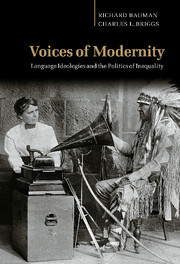Book contents
- Frontmatter
- Contents
- Preface
- 1 Introduction
- 2 Making language and making it safe for science and society: from Francis Bacon to John Locke
- 3 Creating modernity's others in seventeenth- and eighteenth-century England: antiquarian and philological inflections
- 4 The critical foundations of national epic and the rhetoric of authenticity: Hugh Blair and the Ossian controversy
- 5 Language, poetry, and Volk in eighteenth-century Germany: Johann Gottfried Herder's construction of tradition
- 6 Scientizing textual production in the service of the nation: the Brothers Grimm and Germanic philology
- 7 The making of an American textual tradition: Henry Rowe Schoolcraft's Indian researches
- 8 The foundation of all future researches: Franz Boas's cosmopolitan charter for anthropology
- 9 Conclusion
- References
- Index
4 - The critical foundations of national epic and the rhetoric of authenticity: Hugh Blair and the Ossian controversy
Published online by Cambridge University Press: 22 September 2009
- Frontmatter
- Contents
- Preface
- 1 Introduction
- 2 Making language and making it safe for science and society: from Francis Bacon to John Locke
- 3 Creating modernity's others in seventeenth- and eighteenth-century England: antiquarian and philological inflections
- 4 The critical foundations of national epic and the rhetoric of authenticity: Hugh Blair and the Ossian controversy
- 5 Language, poetry, and Volk in eighteenth-century Germany: Johann Gottfried Herder's construction of tradition
- 6 Scientizing textual production in the service of the nation: the Brothers Grimm and Germanic philology
- 7 The making of an American textual tradition: Henry Rowe Schoolcraft's Indian researches
- 8 The foundation of all future researches: Franz Boas's cosmopolitan charter for anthropology
- 9 Conclusion
- References
- Index
Summary
Is it not strange that, at a time when we have lost our Princes, our Parliaments, our independent Government, even the Presence of our chief Nobility, are unhappy, in our Accent & Pronunciation, speak a very corrupt Dialect of the Tongue which we make use of; is it not strange, I say, that in these Circumstances, we shou'd really be the People most distinguish'd for Literature in Europe?
David HumeIntroduction
Hume's paradoxical query, posed in 1757 and often quoted in histories of eighteenth-century Scotland, expresses well the deep ambivalence of mid-eighteenth-century Scottish intellectuals towards their political condition, their language, and their literature. While Hume's own writings contributed in no small measure to Scotland's – and especially Edinburgh's – literary and philosophical reputation as “a hotbed of genius,” he was also closely involved in the production, publication, and promotion of a series of literary works that followed soon after he penned the above observations and that did indeed mark Scotland as the nation “most distinguish'd for Literature in Europe.” Between 1760 and 1763, James Macpherson offered to an increasingly receptive public three volumes of translations from the Gaelic poetry of Ossian, a third-century Celtic bard: Fragments of Ancient Poetry (1760), Fingal (1762), and Temora (1763); these three works were collected in two volumes in 1765, under the title The Works of Ossian, The Son of Fingal, Translated from the Galic Language by James Macpherson (1765).
- Type
- Chapter
- Information
- Voices of ModernityLanguage Ideologies and the Politics of Inequality, pp. 128 - 162Publisher: Cambridge University PressPrint publication year: 2003
- 1
- Cited by

